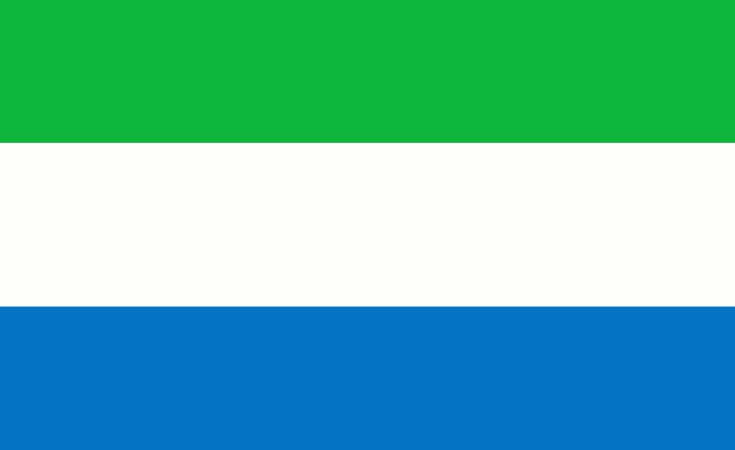New electoral laws, high youth unemployment and low trust in government could be decisive in this month's polls.
Sierra Leoneans head to the polls on 24 June to elect a new president, parliamentarians, mayors and local councillors. This will be the fifth consecutive election cycle since the end of the country's civil war in 2002, marking 21 years of democracy.
Despite a legacy of competitive polls and peaceful transfer of power, these elections come at a crossroads for the country. Sierra Leone faces economic and political tensions, gender inequity, political mistrust, high youth unemployment and widespread poverty.
Voting will be competitive. Incumbent President Julius Maada Bio of the Sierra Leone People's Party (SLPP), who seeks a second five-year term, is up against major contender Samura Kamara of the All People's Congress (APC). In the 2018 elections that featured 16 candidates, Bio won by a slim majority of 51.8% of the total vote, to Kamara's 48.2% following a runoff.
How will the country's current context affect outcomes?
Youth unemployment stands at nearly 60%, one of the highest in West Africa. The youth (aged 35 and under) constitute 60% of the voting population of 3.4 million and could be a decisive factor in the election results.
Bio has the advantage of incumbency but major economic obstacles threaten his chances of remaining president
Almost two-thirds of the population fall below the poverty line. The country's economy is burdened by the slow recovery from the 2014 Ebola crisis and COVID-19, and the fallout of the Russian-Ukraine war. Fiscal deficits have deteriorated due to macroeconomic headwinds and policy slippages, and risks to debt sustainability have intensified. The annual inflation rate (year-on-year) for February reached a record high of 42.7%, with national yearly food and non-alcoholic beverages inflation at 50.2%. Fuel costs have doubled.
In August last year, protests against economic hardships in Sierra Leone sparked a brutal police crackdown, resulting in the deaths of over 21 civilians and six police officials. In the 2022 Afrobarometer survey, 63.6% of Sierra Leoneans felt the country was heading in the wrong direction.
For some international watchers, the riots were a shock, particularly as Sierra Leone has been lauded for its successful post-conflict reconstruction following its 11-year civil war. To many keen Sierra Leone observers though, the August violence wasn't surprising, as it took place in opposition strongholds. Although Bio has the advantage of incumbency, these major economic obstacles threaten his chances of retaining the presidency.
Ahead of the election, women's inclusion and participation have also come strongly to the fore. The 2022 Gender Equality and Women's Empowerment Act is a monumental step, but the country has a Gender Inequality Index value of 0.644, ranking it 181 out of 191 countries.
Experts believe three significant recent electoral reforms will improve the credibility of the polls
Women represent just 12% of 146 Members of Parliament (MPs), seven of 35 cabinet positions, and 18% of local council seats. The new law requires that women make up 30% of government appointments and political party candidates in parliamentary and local elections.
Democracy watchers anticipate that the gender equality quota will affect the election outcome, especially parliamentary and local council polls. But gender advocates are concerned that political parties won't strictly adhere to the new law in the nomination of candidates. Gender champions also worry that women could be placed at the bottom of party lists to secure the 30% quota, impairing their chances of selection.
Three significant electoral reforms will govern the forthcoming polls: the Public Elections Act 2022, the Political Parties Act 2022 and the Local Government Act 2022. Experts believe these will improve the credibility of the elections.
However, there's mistrust between the main opposition and the Electoral Commission for Sierra Leone. This is driven by a legacy of political grievances arising largely from the removal of APC MPs following a 2018 High Court ruling that gave the SLPP a majority in Parliament. The re-demarcation of constituency boundaries based on the mid-term population census also fuelled tensions.
Public education is urgently needed about the new Public Elections Act, especially on proportional representation
Mistrust was further deepened by the decision to run parliamentary and local council elections under a proportional representation system rather than the customary constituency-based first-past-the-post process. This decision was unsuccessfully challenged in the Supreme Court by the APC. The presidential and mayoral elections will maintain a majoritarian and first-past-the-post electoral system, respectively.
Highlights of the new Public Elections Act include: introducing a voter identification number to curb electoral malpractice and fraud, giving the electoral commission authority to announce election dates, and using proportional representation for mayoral and local council elections. But there has been little public education on proportional representation and election results management.
Several grey areas remain unresolved, such as the absence of a specific time frame for concluding presidential post-election litigation. Further, the new act empowers the electoral commission to cancel any result in any area affected by electoral violence or malpractice. Malicious political actors could use this to mar the process in their opponents' strongholds.
To improve understanding and confidence in the process, the electoral commission and all stakeholders must urgently intensify public awareness about key aspects of the Public Elections Act, especially proportional representation. And clarity is needed on including women in proportional representation lists to achieve the 30% quota required by law.
Emmanuel Yeboah and Mawusi Yaw Dumenu, Ghana Center for Democratic Development and Enoch Randy Aikins, Institute for Security Studies


